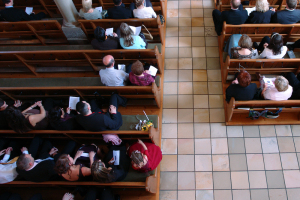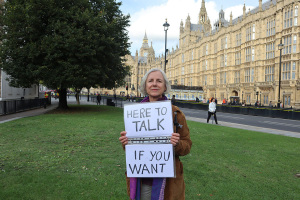What are the Challenges of American National Identity?
Harvard faculty members discuss about questions raised by the book, Who Are We? The Challenges to America’s National Identity.
In responds to Samuel Hungtington’s new book, “Who Are We?: The Challenges to America’s National identity,” a lively discussion between three Harvard faculty members took place last week in Andover Hall at Harvard University.
The book has sparked numerous impassioned responses, focusing particularly on Huntington's assertions about the current wave of Latin American immigration.
Harvard Divinity School gave Huntington a chance to face some of his critics in a panel discussion on Tuesday, Oct 12. The panel was comprised of Huntington, Chairman of the Harvard Academy of International and Area Studies, David Little, the T.J. Dermot Dunphy Professor of the Practice in Religion, Ethnicity, and International Conflict; and Davíd Carrasco, the Neil L. Rudenstine Professor for the Study of Latin America.
Huntington first adressed a diverse, standing-room-only crowd of graduate students, professors, and other interested individuals. He put America’s national identity crisis in the context of the global shake-up of ethnicities brought on by higher levels of economic interations, revolutions in communication and transportation, and increased waves of immigration.
"Can Muslims be real French people? Can Turks be real Germans?" he said that other countries are asking the same questions.
The book, "Who Are We?" asks whether recent Mexican immigrants, who are entering the United States in record numbers, can adopt what Huntington identifies as America's core identity, characterized by the values planted here by America's original English Protestant settlers - hard work, individualism, social reform, religiosity, and the rule of law.
"Would America be the country it has been if it were settled by French, Spanish, or Portuguese Catholics? No, it would be French Canada, Mexico, or Brazil," Huntington asked.
Although the question only takes up one chapter of the book, Huntington pointed out, it stirred up by far the greatest controversy.
Little questioned the way Huntington went about defining America's national identity. Quoting Max Weber, he defined ethnic identity as "a subjective belief in common descent or common origins." According to Little, the operative word here is "subjective."
"The notion of national identity is normative, not descriptive. It is always a matter of 'imagined selves,' of what we want to be."
Identities are socially constructed, often in the midst of conflict, to establish lines between insiders and strangers. They are dynamic, not static, and subject to contestation between majorities and minorities. People make their identities, Little said.
Little criticized Huntington for treating American Protestantism as if it were a homogeneous and monolithic force. Conflict over values abounded in the early colonial period, he pointed out.
Carraso, an anthropologist who has written extensively on the religion of the Aztec civilization, took exception with Huntington’s use of the word “core” to characterize America’s identity.
"The notion of a core has the virtue of clarity and simplicity, but the historical and ethnographic record suggests that culture is a crossroads or even a borderland."
Some of Carrasco's strongest criticisms concerned bilingualism and the danger Huntington saw in allowing Spanish to become a second national language of the United States.
"The U.S. has been called the cemetery of foreign languages," he said, referring to the hostility American schools and other institutions have demonstrated toward the retention by immigrants of their native languages.
He quoted studies showing that bilingual youngsters tend to do better on almost all cognitive tests and that most of them become fluent in English by age 17.
"In other words, we've got the crossroads in our brains, and we're better off for it," he said.





























